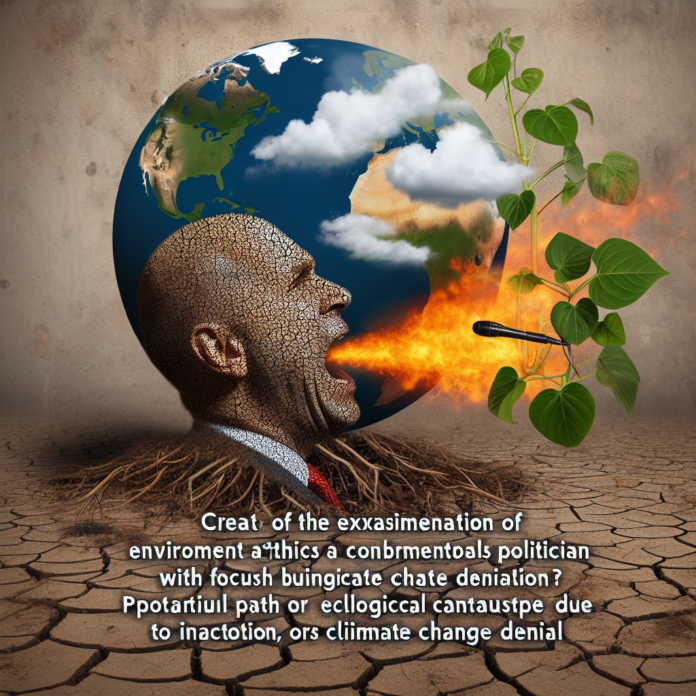Climate Change Denial: Trump’s Environmental Ethics Examined
In an era marked by unprecedented environmental challenges, the imperative to address climate change has never been more urgent. However, the recent past has seen significant hurdles in this quest — one of the most formidable being climate change denial, particularly prominent during the administration of former U.S. President Donald Trump. The Trump era’s environmental ethics reflect a broader conflict between regressive traditionalism and progressive values, a clash that has significant implications for the future of our planet.
Historical Context and Policy Implications
From the moment he took office in 2017, Trump’s stance on environmental issues was clear. His administration systematically rolled back numerous environmental protections in favor of economic gain and deregulation. One of the most controversial actions was the decision to withdraw the United States from the Paris Agreement in 2017, a landmark international accord aimed at mitigating climate change by reducing greenhouse gas emissions. This withdrawal not only isolated the U.S. on the global stage but also ignored the urgent scientific consensus about the need for immediate and decisive action on climate.
Historically, climate change denial has roots in economic and industrial interests dating back to the early 20th century. The fossil fuel industry, in particular, has long battled against regulatory measures that would inevitably reduce their profits. However, what made the Trump administration’s environmental ethics particularly egregious was the sheer scale and overt nature of its anti-environmental stance. By positioning climate change as a hoax perpetuated by foreign powers and left-wing activists, Trump appealed to a base of traditionalists wary of progressive change and supportive of nationalistic policies.
Traditionalism vs. Progressive Values
The resistance to climate action under Trump can be seen as an extension of a broader traditionalist worldview, which often values immediate economic benefits and resists regulatory control perceived as stifling personal and business freedoms. These values align closely with a conservative ethos that prioritizes historical norms and economic growth over environmental sustainability.
This mindset starkly contrasts with progressive values that emphasize the responsibility of the present generation to safeguard the planet for future inhabitants. Progressive policies advocate for comprehensive scientific research, green technologies, and international cooperation, grounded in the understanding that climate change is a global issue requiring collective action.
The Role of Religion and Ethics
The ethical dimension of environmental policy is also deeply intertwined with religious and moral perspectives. During Trump’s presidency, support from Catholic conservatives, particularly those affiliated with the culture surrounding the Latin Mass, revealed a complex relationship with his environmental policies. This faction, often resistant to progressive stances, held significant sway in promoting traditionalist values that sometimes conflicted with more contemporary ethical approaches to environmental stewardship.
In contrast, Pope Francis has emerged as a vocal proponent of climate action and environmental justice. His 2015 encyclical, Laudato si’, calls for a renewed commitment to "care for our common home." By framing environmental degradation as a moral and spiritual crisis, Pope Francis challenges both conservative Catholics and the global community to reconsider their responsibilities. His messages emphasize interconnectedness and the necessity for exploitation-free and sustainable development — principles that starkly oppose the traditionalism observed in Trump’s policies.
The Consequences of Denial
The repercussions of climate change denial are already evident, with increased frequency of extreme weather events, rising sea levels, and declining biodiversity. The Trump administration’s rollbacks on environmental regulations, such as those protecting air and water quality, have compounded these issues, exacerbating the vulnerability of ecosystems and human communities alike.
Moreover, by undermining scientific research and environmental agencies, the Trump era set back years of progress in understanding and combating climate change. Efforts to delegitimize climate science continue to reverberate, posing ongoing challenges for policy-makers and activists striving for meaningful environmental reforms.
Conclusion
Examining Trump’s environmental ethics through the lens of climate change denial highlights a significant ideological divide: traditionalism, with its conservative and often short-sighted values, versus progressiveness, with its emphasis on sustainability, scientific integrity, and global cooperation. The choices made by the Trump administration underscore the pernicious effects of climate change denial, effects that will be felt for generations.
It is incumbent upon current and future leaders to heed the warnings of scientists, activists, and ethical leaders like Pope Francis. Addressing climate change is not merely a policy choice but a moral imperative, demanding a unified global commitment to truly care for our common home. As the world grapples with this crisis, it remains clear that progressive values — rooted in science, inclusivity, and foresight — offer the most viable path forward.
